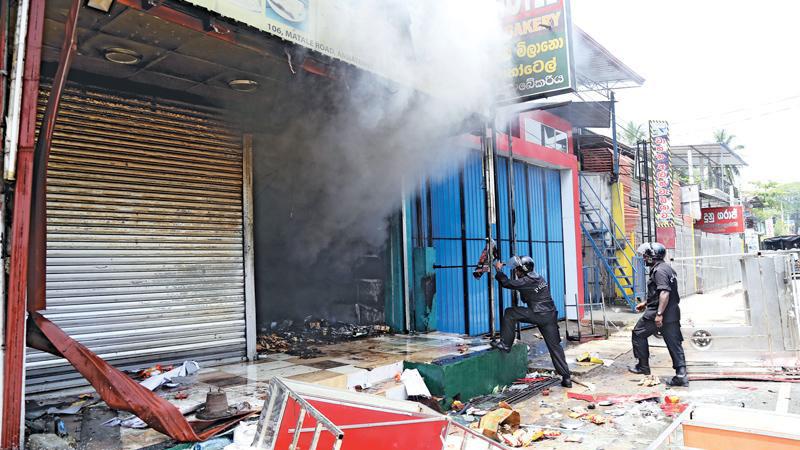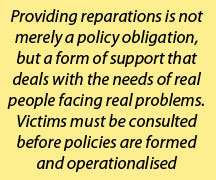
Sri Lanka has borne the harsh burden of a 30-year war. Hardly a decade after the end of that brutal conflict, it is not comforting to hear of the violent incidents that took place in areas such as Digana and Aluthgama only last year. They are tell-tale signs of brewing tension; and a wake-up call for all Sri Lankans lulled into a false sense of comfort by the end of the active conflict.
It only takes one spark to destroy the buildings, roads and ports that have taken years to construct. Economic development cannot be guaranteed under the risk of conflict. Continued marginalisation, growing ethnic insecurities and mistrust between communities that have led to generational grudges can take our country back 30 years. Right now, our united goal should be to build an environment of sustainable peace.
Among the many avenues that are necessary in building such an environment, one critical process is providing reparations.
 Sri Lanka’s journey to repair, restore and rebuild the lives of suffering or marginalised communities after the end of the war has been slow. But a significant effort has been made in consulting the communities regarding the proposed mechanisms.
Sri Lanka’s journey to repair, restore and rebuild the lives of suffering or marginalised communities after the end of the war has been slow. But a significant effort has been made in consulting the communities regarding the proposed mechanisms.
Providing reparations is not merely a policy obligation, but a form of support that deals with the needs of real people facing real problems. Victims must be consulted before policies are formed and operationalised.
Their needs and concerns are vital. Addressing the complex challenges they face will help to eliminate the deeper roots of conflict that often go unnoticed.
Consulting victims is also a way of telling them - we hear your concerns, they are important to us, and we will do something about it. It makes reparations a mechanism that builds trust between the victim and the state. It bridges the gap between what victims need, and the policies that will be implemented.
Consultation Task Force
Sri Lanka’s progress on ‘Consultation and Outreach’ is a case study example of putting victims first.
It is through the Consultation Task Force on Reconciliation Mechanisms (CTF) that Sri Lanka followed its Consultation and Outreach program. Its objective was to collect and consolidate public opinion on the proposed Transitional Justice (TJ) mechanisms - including Reparations.
The CTF went beyond its objective, even allowing the public to present its own ideas and propositions about the right way forward. These opinions matter.
The CTF was supported by a group of experts and a group of representatives who played a vital role in garnering support, creating awareness and getting an input at the grassroots level.
The experts consisted of consultants with international experience and knowledge on TJ who operated at a national level. Through this, the CTF established connections with multiple organisations/ civil society groups such as families of the disappeared, women’s groups, the military, lay religious, professional and media organisations, and those engaged in the creative arts.
The representatives led the Zonal Task Forces (ZTF) that were placed across the provinces in Sri Lanka to hold public meetings and focus group discussions. The ZTF consisted of civil society members, professionals, former public servants and some members of the clergy, and was a cross-section of society, representing the many ethnicities, social groups, languages and genders.
The ZTF was a strong access point to communities and served as a trust-building mechanism between the CTF and the public. The representatives consisted of locals from the area who spoke the language and were familiar with the people’s concerns which made victims feel safer to communicate openly and build more trust in the reparations process. The ZTF especially requested the presence of the Human Rights Commission (HRC) to witness the consultations to make the process more transparent and to prevent any issues that arose at the time.
The final report of the CTF was published and made accessible to the public. It serves as a roadmap/guideline when forming the Office of Reparations.
Consultations give primacy to vulnerable groups such as women, children and people with disabilities and can help the Office of Reparations provide support towards specific issues in a sensitive manner. Consultations permit victims in hard to reach communities to build better awareness on the different types of reparations they can receive, such as rehabilitation, resettlement, access to health services and education, infrastructural development and even psycho-social support.
These are all forms of reparation that go beyond mere monitory compensation that many do not know they have a right to access.
Consultation and outreach help those most affected by war and conflict to have a say in the support they receive from the state. This input is vital when forming and implementing reparations policies.
Taking an example from the CTF, the Office for Reparations too can implement a similar consultative/ outreach mechanism attached to it to better understand victims’ needs, concerns, and their aspirations tobuild a peaceful nation.
